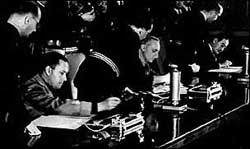Eighty years ago, finding the limits to solidarity amongst dictators
Germany, Italy and Japan signed what was officially know as the Tripartite Pact, but is better known as the Berlin-Rome-Tokyo Axis as an extension of the original Berlin-Rome Axis. The signatories undertook to assist any other if it was attacked by “a Power not at present involved in the European war or in the Sino-Japanese conflict”, in practise the United States or the Soviet Union. The risk of this happening was slight: Stalin was busily appeasing Hitler and had secured his eastern frontier against Japanese encroachment already; existing agreements with the USSR – in practice the Ribbentrop-Molotov pact which partitioned Poland - were to be left alone; US isolationist forces were so strong as to make intervention in Europe highly improbable and intervention against Japan only a little less so. If the Pact served any practical purpose it was to fire a shot across the bows of President Roosevelt who had shown himself willing to face up to Japan, mostly recently with economic sanctions. The Italians had some hopes that Japanese pressure on British interests in the Far East might yield gains for them in the Mediterranean. There was little direct potential benefit for Germany, although its status as the senior European party was flagged by signing the agreement in Berlin.
The whole perfomance barely qualified as a major diplomatic agreement. Hitler himself did not deign to sign the document, but left the task to Ribbentrop, his foreign minister. Mussolini sent Ciano his foreign minister to sign and Japan was only represented by its ambassador to Berlin. Apart from its supposed effect on the US, the Pact was littlemore than a vague gesture of solidarity amongst the anti-democratic powers. Germany and Italy recognised Japan’s primacy in the Far East and Japan recognised German and Italian primacy in Europe. All the parties affirmed their support for a new world order under their leadership. It was supposed to last ten years.
A scheme to extend dictatorial solidarity in Europe had a less happy start. Spain started to sound out its prospects in the new world order. One of the leading figures in Franco’s regime, Serraño Suñer, visited Rome and Berlin. Suñer’s position was mildly ambiguous; he was interior minister and had no official involvement in foreign policy (although he was to become foreign minister within weeks); he was probably best known as Franco’s brother-in-law – they had married sisters – and was known as the cuñadissimo, a humorous counterpoint to Franco’s semi-official title of generalissimo; he was one of the leaders of the Falange, Spain’s quasi-Fascist party, a powerful but far from dominant element in Franco’s de facto coalition of right-wing forces; he was an ideological fan of closer ties to Germany and Italy. When he presented his shopping list of territories to be allowed to Spain as a reward for entering the war on Germany’s side, he was taken aback when Ribbentrop informed him that Spain would also have to give up one, and possibly all, the Canary Islands to Germany as part of the deal. Madrid was too attached to the Canaries for such a trade ever to have been acceptable; acute awareness that Britain, even at its military low point, could have easily seized the Canaries, was to be a powerful factor in keeping Spain neutral.
In late September King George VI had instituted the George Medal as an award open to civilians as well as the armed forces for gallantry “not in the face of the enemy”. It ranked below the George Cross. The Luftwaffe’s massive raids on Britain had created the need for a way in which the heroism of emergency services and ordinary members of the public under the bombs could be rewarded. The Blitz had brought the front-line to the entire country and blurred the line between combatants and non-combatants. The first batch of fourteen George Medals awarded went mainly to firemen, but three women – two ambulance workers and an ARP warden - also featured. Oil depot workers and a dock labourer were recognised as well. The war’s three first George Crosses were also awarded; two to army bomb disposal men and one to a rescue worker.



Comments
Post a Comment